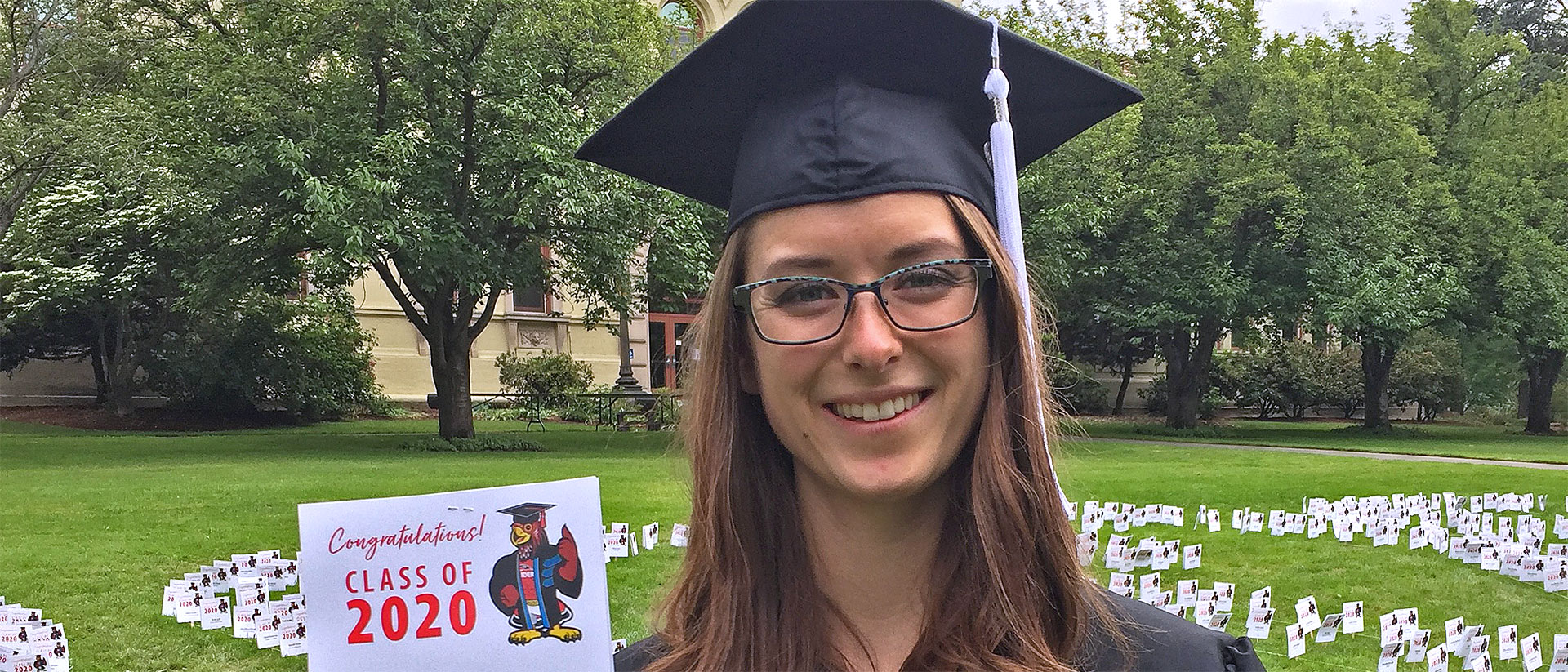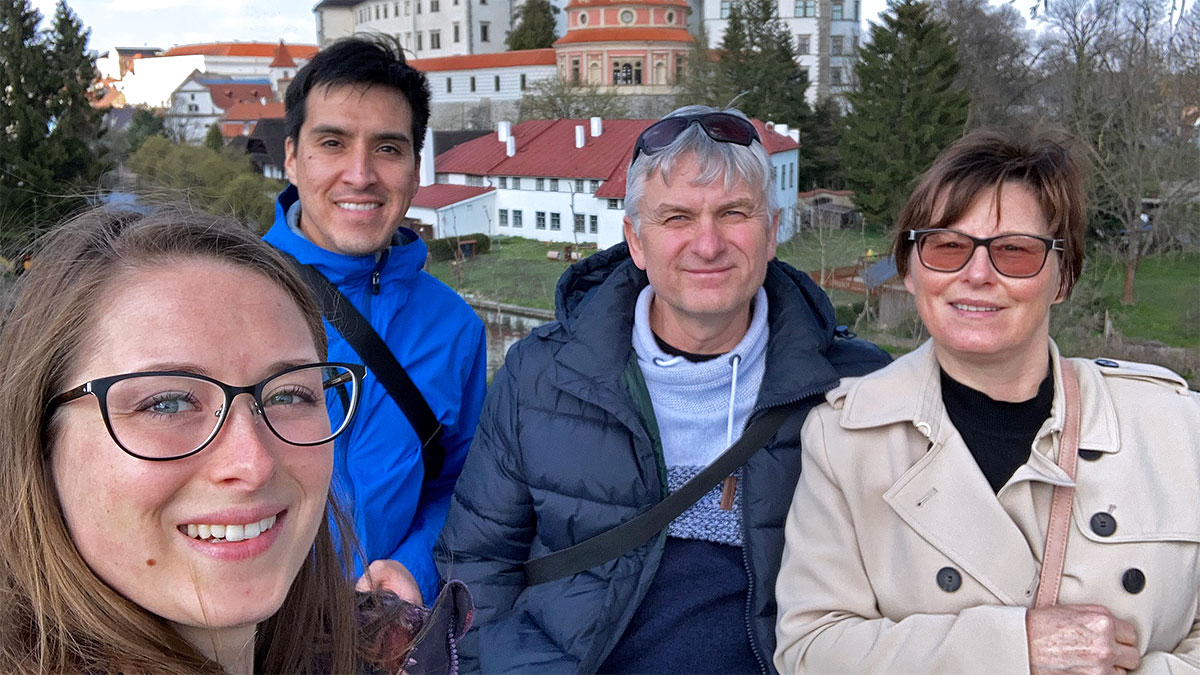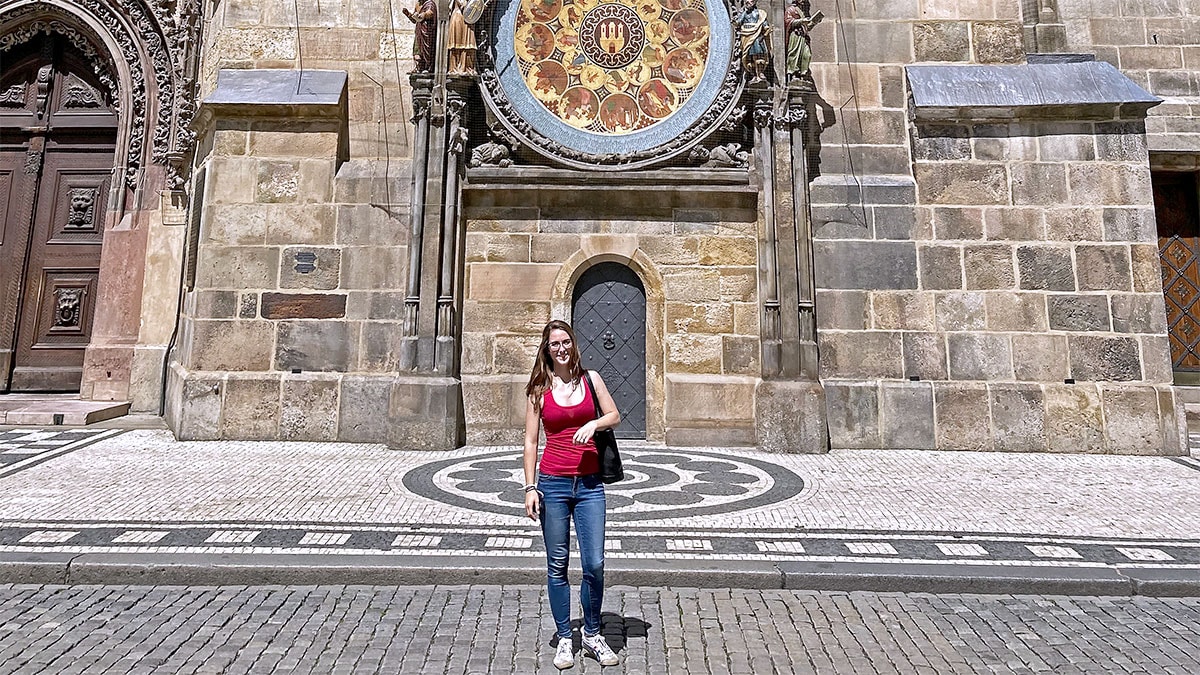- be_ixf; php_sdk; php_sdk_1.4.18
- 10 ms
- iy_2025; im_07; id_11; ih_14; imh_49; i_epoch:1.75227057456E+12
- ixf-compiler; ixf-compiler_1.0.0.0
- py_2025; pm_06; pd_10; ph_02; pmh_49; p_epoch:1.74954895432E+12
- link-block; link-block_link-block; bodystr
- pn_tstr:Tue Jun 10 02:49:14 PST 2025; pn_epoch:1.74954895432E+12
- 0 ms
- be_ixf; php_sdk; php_sdk_1.4.18
- https://sou.edu/academics/where-in-the-world/
- https://sou.edu/academics/where-in-the-world/

Where in the World?
Marketa Dominguez-Adameova’s Story
September 6, 2021
By Dianira Piceno, Senior English Major.
Pictured above: Marketa Dominguez-Adameova, English Program Alum.
Marketa Dominguez-Adameova was born in Teplice, Czech Republic (Now called Czechia). She enjoys gardening, animals, the great outdoors, DIY house remodeling, and books.
The English Program at SOU is known for being uniquely diverse as it brings students in from many parts of the country, even the world. In this guest post, Marketa Dominguez-Adameova ’20 writes about her experience coming to the US. Although she was not a traditional international student, Marketa gives insight on the significance of studying abroad, explaining how it has shaped her life and her career.
In 2012 when I was twenty, I decided to come to the US to be an au pair (a live-in nanny). I ended up moving to San Francisco to live with a host family and take care of two children (3.5 years and 4 months old). Some time later, I fell in love and after my two years as an au pair were up, I transferred from a J1 visa to a student F1 visa and went on to attend a language school in San Francisco. Eventually, I got married and I started attending City College in Berkeley, CA. Then my husband and I moved to work in Medford, OR and I continued with school at Rogue Community College. I transferred to SOU in 2018 and graduated in 2020 with a BA in English. While at school, I always tried to stay employed part time so that I could pay for school as I went. In the beginning I worked as a babysitter, then I worked as a new front-desk new staff trainer at Quave Clinic in Medford.
My experience as an international student might be slightly different than usual as my husband and I were already living in southern Oregon due to his work. I did not want to move to a distant university, so I chose Ashland’s SOU and I loved it. The US and the Czech Republic (CR) are just two different worlds. It is important to say that at the time I was born, the country had just recently regained its independence and freedom after some fifty years of oppression by the German Nazis and the Russian Communists. Thus, the country has changed very much over the years of my life and it continues to do so like any other nation in this internet-driven era.
The very first thing I noticed in the US was that a lot of things were bigger than in Europe: cars, cities, houses, spoons (weird huh?), trashcans, food portions and some people too. The US is incredibly consumeristic and sad to say, wasteful. I grew up recycling literally everything and was very happy to come back to it. I would say that where I grew up life and lifestyle is more humble and more thoughtful to nature, and people own less stuff.

Marketa with her husband and parents.
On the other hand, Americans are the most professional people I have ever met and sometimes I miss that in Czech people. I guess I can say that we are not that great in customer service and we have ways to go to learn how to treat people in the service sphere. This leads me to say that I love how friendly and welcoming Americans are in general; whether it was small-talk with a cashier, a gas station attendant, or people on the streets. I know sometimes Europeans say that American ‘how-are-yous’ are shallow and they don’t really want to know! But to me, this type of greeting is still more welcoming than hearing just “good day” or nothing at all. Yesterday, I was riding in a bus and sneezed three times in a row (no covid, promise) and not a single person said anything. I know that in the US there would be at least two people who would say “bless you.”
It seems that in the years of oppression and the inability to trust one’s neighbor the Czechs learned to be more reserved and to mind their own business; however, after cracking their shells they can be very kind, friendly and welcoming. Those fifty years also made us a strongly atheistic country (also weird, I know). Growing up as a Christian I was always an outlier in my class; thus being able to interact with Americans, who were usually very open about their religion, was refreshing. Finding a good contemporary Christian music radio station is not an easy task here in the CR.

Marketa in Prague by the astronomical clock called Orloj, which is 611 years old.
For my education, I obtained my primary and secondary education in the CR and my college education in the US, so I am not really able to compare them with their counterparts. The cool thing about the Czech Republic is that our education is free up to the age of 26, so if one manages to get their doctor’s degree by that age, the tuition is free. Also, we have no school buses so kids go to school on their own and use public transportation from an early age. We don’t have specific names for various grades of high school and college so we just call it the 1st, 2nd, 3rd and 4th year of……fill in the blank. In the US, it took me forever to remember which year was freshman, sophomore, junior and senior.
Fun fact, in the CR there are 9 grades of elementary school and there are no middle or junior high schools. The kids instead can go to a four-year high school, which usually focuses on a specific trade or sphere: industry, transport, medicine, veterinary, economics etc. For example I went to a secondary school of printing trade and graphic design and in my freshman year I’d have 4 days of general ed subjects and one day of graphic design workshop. When I reached sophomore year, I’d have only three days of general ed and two full days of practical ed in graphic design. By the time students graduate they have four years of training in their trade, they are ready for a job, or they can continue to a university to deepen their knowledge. Elementary school grads (remember, it’s 9 years) can also go to a three-year vocational school, after which they are competent to work in their trade but do not gain a high school diploma (cooks, hairdressers, welders, auto mechanics and so on). There are also so-called gymnasiums (grammar schools) that kids can attend either for 8 or 4 years, depending whether they transfer from 6th grade or they go there for their secondary education (high school). These schools do not usually have a specific focus and are more of a preparation for university studies such as law, medicine or science.
When I was in high school I had an amazing English teacher and she made me fall in love with the language (YAY for you amazing teachers, you change people’s lives). In my sophomore year I decided I wanted to come to the US as an au pair, which was the easiest and the cheapest way to get to the States. My plan was to spend two years here, work on my language and then return to the Czech Republic and attend the Charles University in Prague, majoring in translation studies.
Overall, my experience in the US was great and I loved all of it, even the tears above math and physics homework, because they made me stronger. Everybody’s always been patient and kind to me. I had amazing teachers (you know who you are), advisors (shoutout to Edward Derr, please tell him he is a rockstar) and classmates. The only thing I missed a little was the tighter bond of college life but I understand that since I lived off campus, and was maybe a bit old for my peers, I was more of a loner. I have no regrets though and would have done it all over again!
I think that the most amazing and priceless experience about studying abroad is that it opens our minds and forces us to step out of our comfort zone, allowing us to see how different people do things differently. I believe that traveling is one of the best ways to learn, so if it is combined with education it is the best thing one could do for their future. Making new friends is always a great byproduct as well.
Nevertheless, it can also get very expensive, at least for people coming to the US. Americans have the advantage of knowing a world language from the get go and have the option to travel and study abroad, possibly getting an even better education for way less money (thinking of countries where public college is free or very cheap for international students like Germany, Slovenia, Norway, Poland, Austria, Greece and more).
Life is good at the moment and I am thankful for all that I have learned at SOU and in the US. The year since my graduation has been a year of mostly getting ready for the relocation from the US to Europe. I worked full time right from graduation, then I quit my job before Christmas and worked full time for two months on our fixer upper, trying to finish all we needed to so that we could rent the house. We moved in March and the last 2.5 months we have been relaxing, looking for jobs and exploring whatever we could, during a fairly strict lockdown. Now when things are opening up we got employed, so it’s a bit of a bummer that it wasn’t the other way around but we are happy and blessed to have jobs, and are eager to dive into these new challenges.
I am currently about to start a new position as an internal translator of medical texts and I am actually dusting off my Czech vehemently. In the 8.5 years I’ve lived in the US, my Czech has gotten a little rusty and my speech can sound a little choppy sometimes.
For any student who is thinking about studying abroad, don’t think too much about it and do it! There is so much to see out there and it very well might be the best decision you have ever made. And who knows, it might change your life in a way you have never thought was possible.
P.S Learn a foreign language or two, it will open even more opportunities.
Thank you to Marketa ’20 for sharing this essay with the English Program Stories.
Like and Follow the English Program page on Facebook for more stories.
Interested in the English program at SOU? Learn more about the programs offered below:
English Home Page | English BA/BS | English Minor | TESOL Certificate Program


